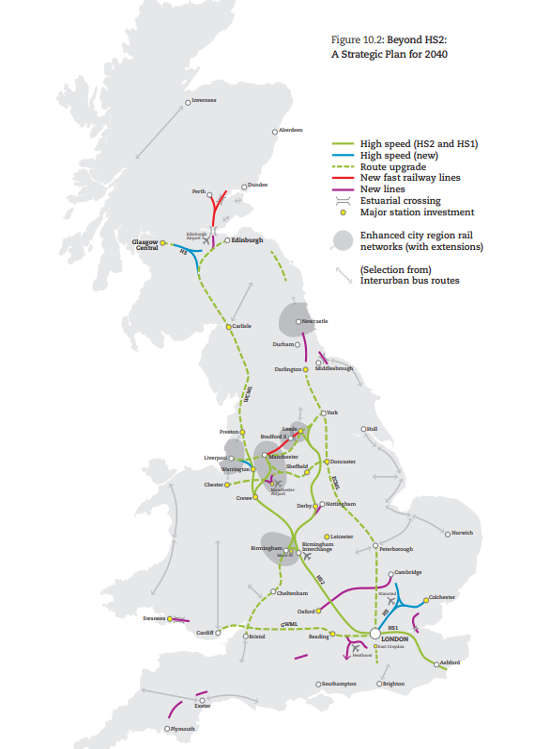High speed rail should be rolled out across the country as part of a strategy to transform the nation's network from its current 'hub-and-spoke’ system centred on London, a new report has said.
Much wider high speed rail connections than the controversial £55bn HS2 plan are needed to tackle the UK's flagging productivity and put 'rocket fuel' into the economy, the report's authors say.
The Beyond HS2 report by think tank Greengauge 21 calls for HS2 to be developed from a “Y” to an “X” shaped network, including connections to Bristol and Cardiff in the south west.
It also calls for the first major upgrade to the East Coast Mainline since the 1980s, including in the area of 'most pressing' between Darlington and Newcastle.
A target of London to Glasgow or Edinburgh rail journey times of 3 hours 15 minutes should be set, with equivalent speed-ups for links between Scotland and provincial cities in England, and could be achieved by 2033 the report claims.
The overall plans to be fully implemented by 2040 cover:
- 101 miles of new high-speed railways (300km/h+)
- 127 miles of new fast railway lines (200-250km/h)
- 97 miles of other new lines (of which the Okehampton-Tavistock reopening and Bedford-Cambridge (EWR) comprise 60% of route mileage)
- 838 miles of route upgrades (of which the three main lines (West Coast, East Coast and Great Western) comprise 66% of route mileage)
- six enhanced city region rail networks (for Birmingham, Bradford, Leeds, Liverpool, Newcastle and Manchester).
- A new rail connection from Kent to Essex, uniting two regional economies to work more effectively together and provide a rail freight M25 bypass to London
- Essex & East Anglia – with a new high speed line from London to Stansted and beyond towards Cambridge/Colchester, alleviating the West Anglia and Great Eastern Mainlines, both of which are at capacity, and delivering a 15 minute London-Stansted journey time, transforming Stansted airport’s attractiveness.

Image from Greengauge 21's report
Looking ahead to 2040, the report states there 'is a shortage of longer term plans for rail, comprising only one or two well-known mega-projects and no overall strategy'.
It adds that there 'is no spatial plan, and regional spatial plans and targets have been scrapped' and suggests that expanding the rail network is a key way to avoid suburban sprawl and traffic congestion.
One of the report's five co-authors, Greengauge 21 director Jim Steer said: 'Britain lacks a long term national railway strategy beyond HS2. We need a plan to put rocket fuel into our economic productivity and today’s report sets out proposals to do so.
'To transform productivity across the whole of Britain, we need to transform the connectivity of dozens of cities the length and breadth of the country. Fundamentally, we need to completely re-orientate the railway from a ‘hub-and-spoke’ centred on London to a fully national network.'
Britain’s productivity continues to lag behind the average for the other six G7 economies, with ONS figures showing a gap of 16.3%. Compared to our European neighbours, the UK’s productivity is lower than Italy by 10.5%, lower than France by 22.8% and lower than Germany by an astonishing 26.2%.
Register now for full access
Register just once to get unrestricted, real-time coverage of the issues and challenges facing UK transport and highways engineers.
Full website content includes the latest news, exclusive commentary from leading industry figures and detailed topical analysis of the highways, transportation, environment and place-shaping sectors.
Use the link below to register your details for full, free access.
Already a registered? Login